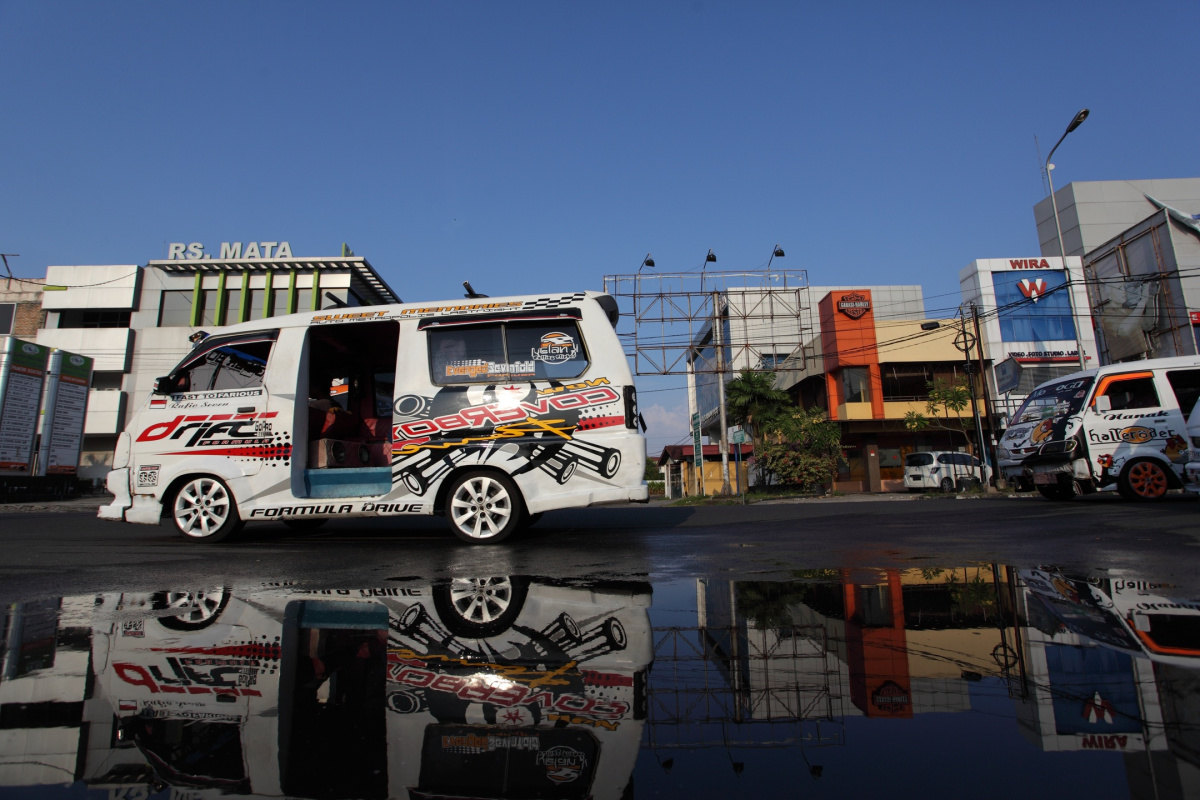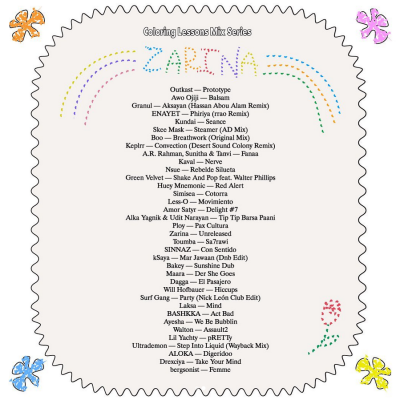
Funkot, Gabber’s Distant Cousin from the Far East
One day, when sitting in an angkot minivan in Bogor, our writer had a weird encounter that made her ears ring; it was funkot, a mix of gabber and Indonesian folk. An essay inspired by the music of Animistic Beliefs who performed at MUTEK festival 2023.
Let me tell you about funkot, a mind-bending sonic concoction that will make your whole body shake in a hellish tremor just like a caffeine overdose would.
My first encounter with funkot was in 2011 in Bogor (West Java, Indonesia). I was visiting the town and had to go around on an angkot – one of the aggressive minivans that is the backbone of Bogor’s public transportation – because it was too expensive to take a taxi. I was crammed into the corner of the angkot, my knees bent and touching other passengers’ limbs. The rear window was decorated with empty liquor bottles. The driver was smoking a kretek cigarette, filling the air with clove- and tobacco-flavored smoke. He pressed play on his stereo, and suddenly this upbeat, thumping rhythm of bass and percussion, high-pitch synth, and lusty vocals blared through the cheap loudspeakers installed at all corners of the vehicle.
The music sneakily seeped through the humid air, enveloping and suffocating me, making my ears ring. It woke up all of my senses unlike any kind of drug could. The only way to get out of the trap of the superfast BPMs was to dance. But of course, I couldn’t dance inside the crowded angkot, so I just shook my head following the beat and let my right leg tremor.
The Global Rise of Funkot
Decades after my bumpy ride with the party-on-wheels minivan, I learned that funkot has climbed the social ladder. Once considered a grassroots form of entertainment, stereotyped as the music of angkot and truck drivers during their long intercity rides, funkot is now an anticipated act in every high-end music festival in Indonesia. All popular festivals at home – Synchronize Fest, Pesta Pora, and Joyland, to mention a few – would have at least one designated party-hard, warehouse/dungeon-vibe electronic music booth where the attendees ignore the main stage and simply dance their hearts out to the DJ blasting funkot.
Record labels such as Yogyakarta’s Yes No Wave, which has an incredibly diverse catalog of experimental music, helped to catapult Indonesia’s funkot to international stages. The global scene, however, would make sense of the astonishingly localized funkot by associating it with gabber, a similarly heart-pumping hardcore techno that was once the pride and joy of Rotterdam. It is funny that Indonesia, a string of spice islands in the Far East that was once under Dutch colonial rule, has come up with its own version of party music.
Despite having similar sound principles, funkot and gabber are not imitations of each other. Instead, they are direct descendants from the globally popular electronic dance music. The street says funkot was born in the hazy underground clubs in Jakarta’s touristy neighborhood of Kota – hence the term «Funky Kota» which was then abbreviated into «funkot».
MUTEK, a festival celebrating talents with avant-garde and original artistry in electronic music and digital art, will have an upcoming festival in Montréal this year. Excitingly, this year’s MUTEK Montréal will celebrate gabber in one of its sessions and invite the best artists of the genre, including the untamed duo Animistic Beliefs, a project of Linh Luu and Marvin Lalihatu. The two will perform with visual artist Jeisson Drenth, who has been a regular collaborator in their shows, to add more experimental nuance to the set. With playful visuals and a sound that evokes wild animals and primordial rites, recordings of their set always remind me of the overstimulation of the party-like angkot ride. Although based in the Netherlands, the unit also enjoys great admiration in Indonesia’s niche EDM scene, especially due to Marvin Lalihatu’s ties with their ancestral roots in the archipelago’s Maluku Islands.
Indonesia, an extremely large country that is very under-represented on the international stage, easily congratulates everything that increases the country’s visibility offshore. However, Animistic Beliefs is not overrated. With colorful makeup and playful costumes, their appearance is as loud as their music. Almost all publications about them say that the duo always fills rooms with wild partygoers, who treat the set as if it is a rite of passage. However, the two are openly queer, and due to the homophobic sentiments that still populate the mindset of the majority of the country, only a niche group of Indonesian youngsters celebrate Animistic Beliefs as the peak of local representation.
Furthermore, I’m not sure that any DJs from Indonesia’s rural towns recognize funkot’s international fame, or even profit from it. Popular grassroots music in Indonesia’s small towns – such as dangdut and koplo – are typically spread the same way as folk songs: no credit for the creators, but everyone knows the songs. Also, everyone is welcome to perform, record, remix, or butcher the songs in any way and even profit from it.
A MUTEK article says that gabber is taking over Montreal. I can’t help but wonder, will the involvement of Animistic Beliefs, and other artists with diverse backgrounds in this year’s event open the gate for more interesting electronic music that is yet to be discovered by the global audience?
Norient is media partner of MUTEK 2023 in Montréal, Canada.
Biography
Published on August 15, 2023
Last updated on October 17, 2023
Topics
From Beyoncés colonial stagings in mainstream pop to the ethical problems of Western people «documenting» non-Western cultures.
From breakdance in Baghdad, the rebel dance pantsula in South Africa to the role of intoxications in club music: Dance can be a form a self-expression or self-loosing.
Why Asia is not a continent and how the aesthetics of the NON Worldwide collective create new utopian notions of multi-centred origins.
Queer is a verb, not a noun. Thinking & acting queerly is to think across boundaries, beyond what is deemed to be normal.
Snap


